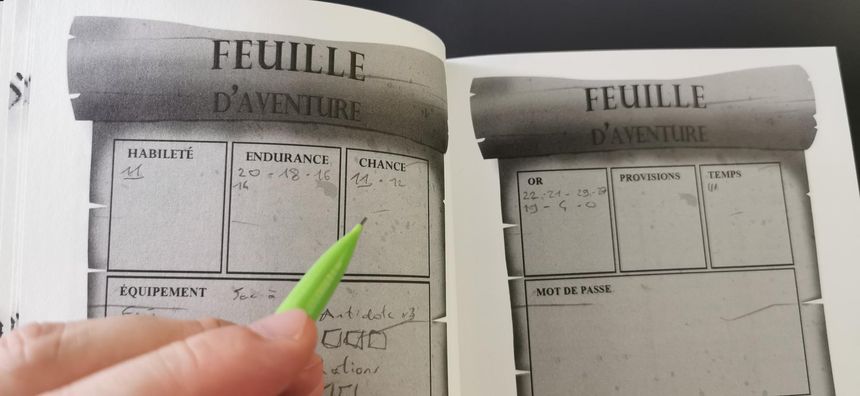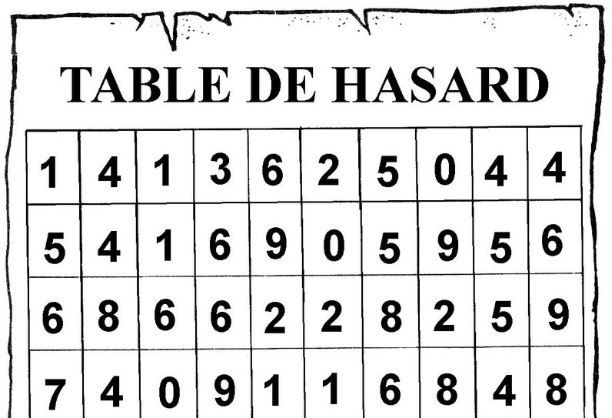No sooner have you started reading the lines of this paragraph than you find yourself facing a terrible monster: an Editorialyst. It turns out that, unlike other creatures of the same species, this one wants to let you know that it is in every way opposed to your way of thinking and refuses to let you pass. To continue reading, you have no choice but to face him in a verbal contest!
As a seasoned adventurer and listener to France Culture, you have a high skill score (here, your ability to use good arguments) but low rhetorical stamina. The Editorialalyst will not hesitate to use dubious arguments, but is experienced in this type of exercise. Here are your characteristics:
You, the hero:
Stamina: 4
Skill: 10
Editorialist:
Stamina: 10
Skill: 6
If you have two dice with you (perhaps you are a hardcore gamer) you can use them, otherwise you can use an online dice generator . The rules are simple:
> First roll two dice for yourself and add them to your skill score.
> Then roll two dice for the Editorialalyst and add them to his skill score.
> The highest result wins the round, and the loser loses one stamina point. If you tie, nothing happens.
> The first of you to reach 0 stamina points loses the verbal contest.
- If you lost the fight, you can go to 13.
- If you’ve defeated the dreaded Editorialyst, you can read on.
- On the other hand, if you cheated (!!!!) and simply decided not to fight, you should go to 7.
Breathing heavily, you stand in front of the Editorialist, whose argument you have just destroyed. And already, you realize one thing: the rules that governed this fight were extremely simple. What made the immense success of the first Book of which you are the hero, The Wizard of the Fire Mountainis very much attached to its tree-structured narrative, but also to its game mechanics, using dice, directly inspired by role-playing games.
At the start of each gamebook, the player will in fact spend a few minutes learning the rules before creating his own character, the avatar he is going to embody. Each work thus begins with a short stage which consists of filling out its “Adventure sheet”, by rolling its main characteristics (Skill, Endurance and Luck) but also by selecting the equipment or abilities that will allow you to get to the end of the story.

“Dice are a legacy of role-playing, entrusts you with the interactive fiction specialist FibreTigre. But that didn’t stop other collections from breaking away. You can’t play in a car with dice, for example. In the Lone Wolf collection, there is a table of chance: you point your pencil at it while closing your eyes, and if you come across a “7” and you have rolled a 7. In the “Sorcery!” collection, there is has two dice at the bottom of each page. So you take a random page and that’s your roll. But we always remain on a random basis…”
By choosing to use the dice, the authors have given their story an element of uncertainty, of randomness, which allows the player to invest a little more in his adventure. “In good LDVELH, tension sets in, the player binds himself to his life points as if it were his own, and his failures worry him and sting him to the quick.assures you for his part Laurent Centro, the director of Alkonost editions . I remember as a teenager making choices and rolling the dice as if I was gambling with my life!”

From one book to another, some rules will vary, either because it is a new collection, or because the author wanted to propose some additions: your character will thus be able, among other things , use magic, learn to joust, even manage entire armies… So many rule systems that allow you to vary the pleasures, for the reader as well as for the author of the Book of which you are the hero.
But the rules don’t matter in the end, as long as they remain simple and easy to access: because only one thing matters, immersing the player in the story.
- By the way, if you want to learn more about how authors build tree-like stories, appointment in 5.
- Whether or not you cheated during the fight against the Editorialist, know that cheating is an essential element of the Books of which you are the hero. If this piques your curiosity, go to 7.
We would love to thank the writer of this short article for this amazing web content
11. The rules of the Books of which you are the hero
Check out our social media profiles as well as other pages related to themhttps://nimblespirit.com/related-pages/
